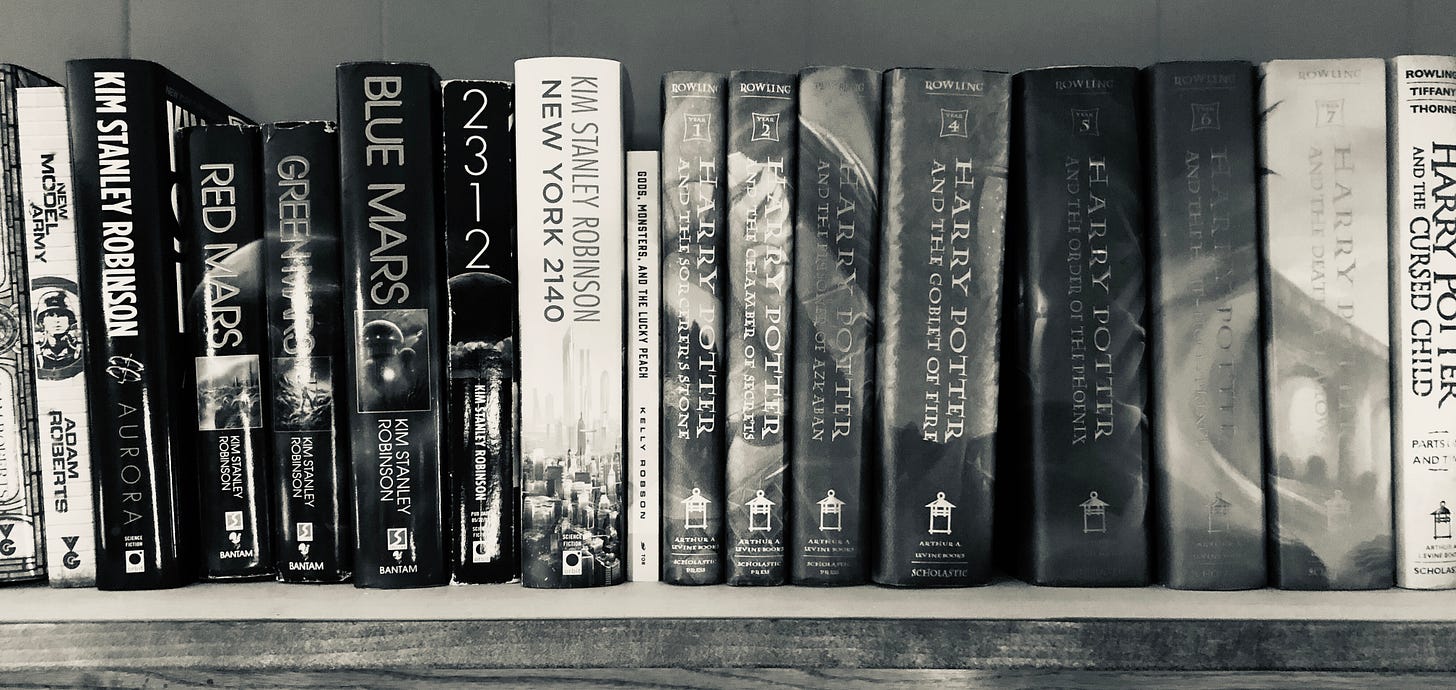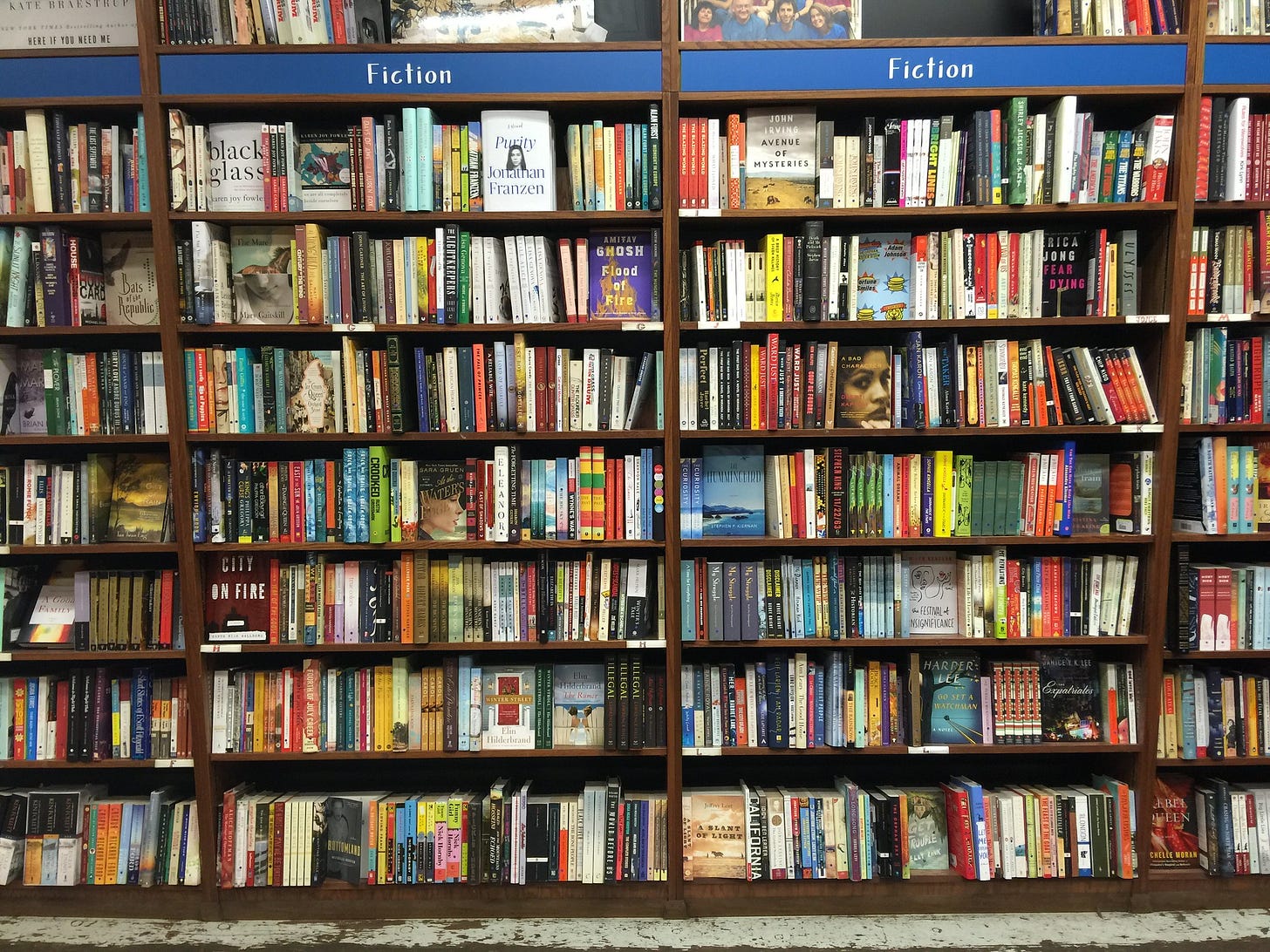Books as a personal image


Hello!
Bonus issue today for y’all. I was annoyed by a list of science fiction recommendations that I came across, and wanted to unpack that a bit more than I did on Twitter. Plus, I had a stack of neat articles that I wanted to share with y’all. Let’s dive in.
On Lazy Internet Lists
Internet lists are something that we’ll never escape from. As long as there are digital-first publications that rely on traffic, they’re generally an easy way to generate traffic for any particular audience. They’re an easy format for readers to quickly scan and move on. I write a lot of them — I do a monthly list of upcoming books for Polygon, and I’ve written my fair share for places like Barnes & Noble’s blog, io9, and The Verge. I generally don’t like writing lists, and I’ve tried to steer towards other formats, but there are certainly places and times when they’re appropriate.
There’s one such list that I came across this morning that particularly annoyed me: “12 Classic Sci-Fi Novels Everyone Who Likes Reading Should Read” by men’s interest site The Manual. I’m always interested in seeing what these types of lists include, and this one is particularly predictable and as a result, dull. I did a bit of a rant on Twitter about it, because it’s one particularly egregious: it has nothing to say.
The premise here is that it’s designed to connect people who don’t like science fiction to science fiction, and lists off a broad swath of novels from the 1800s to the mid-1960s. Broad surveys like this are always difficult, and are usually a headache, because they typically all contain the same entries: Asimov, Heinlein, Clarke, Le Guin, Herbert, etc. This list has books by Jules Verne, Robert Louis Stevenson, H.G. Wells, Aldous Huxley, George Orwell, Ray Bradbury, Robert Heinlein, Frank Herbert, Samual R. Delaney, Kurt Vonnegut, Ursula K. Le Guin, and Douglas Adams.
Here are a couple of the issues I have with this:
- 11 men, 1 woman. 11 white authors, 1 author of color. Le Guin is often trotted out as the token women on these sorts of lists, an effort to say “wait, no! Women wrote SF too!” In Delaney’s case, he’s the token Black author. This is an incredibly narrow range of what science fiction has to offer readers: science fiction is a diverse field, especially in 2019, and lists like this further lock in a narrative that these voices don’t contribute to the field. This isn’t a hard thing to correct for.
- All of the books are at least 50 years old. Chances are, if you’re a reader, you’re passingly familiar with the likes of most of the names on this list, and I’m guessing that if they haven’t enticed you yet, this list isn’t going to.
- None of the blurbs here give you a really good reason to read the book, or offer a good description of what they’re about. Don’t get me wrong, these are all excellent books. But this list either just comes out and says that they’re brilliant, and that you should read them. It’s not a convincing argument.
- There’s a lot of factual errors / assumptions. Verne didn’t kick off “modern science fiction” — Mary Shelley started the proto-genre with Frankenstein, and while Verne and Wells certainly contributed to the early genre, it’s not exactly what I’d call modern. Also, The War of the Worlds radio broadcast didn’t cause widespread panic, Le Guin’s book isn’t about a world where “gender means little” and so forth.
- “And while no one is burning books these days” — dude, have you seen the times we’re in now?
- There’s no overarching theme: these all feel like books pulled off the shelf at random.
- Finally, there’s no indication that this particular writer is knowledgable about the field — and thus, are they really someone to trust for good recommendations? For lists like this, I want more deep, obscure, interesting novels that haven’t had their merits rehashed time and time again.
As I noted on Twitter, if one of my students had written this, I would have sent it back with an F.
So, what does a better version of this list look like? If we start with the basic premise, that you want to introduce readers to science fiction, we have to look for books that are generally appealing to the wider reading audience, but which aren’t so niche-y that causal readers will bounce off of it.
But I’ll take issue with that basic premise: that people widely roll their eyes at science fiction and that it’s a stigmatized genre. When you consistently see Star Wars / Marvel franchise films dominating the box office and where shows like Game of Thrones steer the entire direction of the television industry, the nerds have won. The reason why people don’t read science fiction certainly includes some stigma, but even skeptical readers will follow narratives with good characters, stories, and worlds. Look, my mother — who hated The Hobbit / Lord of the Rings and Harry Potter — blew through all of George R.R. Martin’s Song of Ice and Fire and the Game of Thrones TV show, and had opinions on the ending. She’s decidedly not a genre fan, but was sucked in. The argument that genre entertainment is still stigmatized is a bad place to start from.
Furthermore, you don’t need to skim the top of the genre’s history for an introductory reading list. SF tends to get dated pretty quickly — that said, there are plenty of books that stand the test of time —and there are plenty of great books in there that are worth reading that weren’t included on a high school English class’s syllabus. But these types of lists also shouldn’t ignore more recent books that might not have been branded “classic”.
So, given this premise, what would I include, off the top of my head? For older classics, I’d throw in Isaac Asimov’s The Bicentennial Man, Joe Haldeman’s The Forever War, Ursula K. Le Guin’s The Dispossessed, Joanna Russ’s The Female Man, and Boris and Arkady Strugatsky’s Roadside Picnic. For slightly newer books: Parable of the Sower by Octavia Butler, Downbelow Station by C.J. Cherryh and Ted Chiang’s Stories of Your Life and Others. And, to top it off with some newer reads, The Fifth Season by N.K. Jemisin, The Three-Body Problem by Cixin Liu, Lagoon by Nnedi Okorafor, Aurora by Kim Stanley Robinson and Murderbot by Martha Wells. Another good list? Gary K. Wolfe’s excellent Library of America omnibuses from the 1950s and 1960s.
Before you go all “what about BOOK X, Y, or Z,” this list is a quick one off the top of my head, isn’t designed as end-all-and-be-all canons — and it only includes science fiction! It’s kinda vanilla to anyone within the SF/F genre already. The entire point of this screed is that the genre is too rich and varied to be so blisteringly dull. Lists like the one on The Manual are the laziest of the lazy — a quick scan of the genre’s best-known titles. If you really want your list to stand out, do more than a courtesy glance through your memory or of other, similar lists.
Books as a personal image

Me Magazine published a really intriguing article the other day: “How Reading Became a Lifestyle Brand.” It delves into the bookselling industry and how devoted readers and always-online influences have latched onto the image of books and reading as a way to signal that they’re readers, or that reading is a central part of their lives.
Like the writer (Amy Stephenson), I don’t have any particular objection to this: I own some of this flair, like a Barnes & Noble pouch for my EDC bag and a couple of other things. I certainly take plenty of pictures of books that I’m reading.
One paragraph stood out for me:
But when I consider the arc that brought us to the point where every person under 40 with a bookshelf in their home can’t leave the house without book-themed flair, it’s not all good news. The trend stems from bookstores just trying to stay alive under the crush of shrinking publisher margins and Amazon’s chokehold on brick-and-mortar businesses.
Stephenson points out that bookstores operate on razor-thin margins, and that because they have little control over what price their products are, they have to devote time and space to selling ancillary items — which they can mark up much further than their namesake. The proliferation of bookstores in the post-recession world isn’t *just* because people see the value in their products: it’s because bookstores have more that they can sell — particularly products that allow readers to signal that, well, they love to read.
As someone who’s worked in a couple of bookstores over the years, I’d say that that tracks: bookstores have become much more than just places to buy books: they’re experiential places with robust event calendars, personalized recommendations, and so forth. There’s nothing wrong with that but at the end of the day, it’s well worth remembering that supporting your local indie bookstore is a good thing to do.
Further Reading
Cosplay and Guns. Ever since the theater shooting in Aurora, Colorado, I’ve been worried about one thing: guns in the cosplay scene. A) either someone is going to get shot because a trigger-happy cop will shoot someone who’s carrying a prop weapon, or B), someone is going to bring a live firearm into a convention and shoot a bunch of people.
Cons have stepped up their security, which is good — props are inspected and peace-bound — but while trooping with the 501st, I’ve wondered if we’ll get someone who doesn’t understand what we’re doing and calls the cops. That seems to have happened in California. Fortunately, nobody was hurt, but it’s one reason why I’ve largely stopped carrying around fake guns with me.
Liu on Labels. GoldThread (a sub-publication of South China Morning Post) has a neat profile of Ken Liu, and his distrust of labels. “I drew a little circle around myself and said my books are ‘silkpunk.’”
Making of Aliens. J.W. Rinzler and Titan Books published The Making of Alien earlier this year, and it’s a fantastic look at the making of the film. I’d hoped that he’d follow up with another one, and according to Birth.Movies.Death, he will be: “A great opportunity to write about one of the greatest sequels of all time - James Cameron's follow up to The Terminator! - with the same level of brilliant collaboration and innovative filmmaking.” It looks like it’ll be coming out in April 2020.
More For All Mankind. Apple has apparently renewed its upcoming science fiction series, For All Mankind. I’m looking forward to this one.
SF History. While we’re on the topic of looking deeper into what science fiction and fantasy, I reviewed two books for The Barnes and Noble Sci-Fi and Fantasy Blog: Lost Transmissions and Monster, She Wrote, which delve deeply into the genre’s history.
Currently Reading
I’m still reading the same books I was working on last week, so not much to report there. I did pick up BOOM Comic’s Firefly: The Unification War, which I’ve been wanting to read for a while. I’ve also got a bunch of books on the November horizon that I need to get started on.
That’s all I’ve got for now. (I’ve got a cold, a kid home from school, and a mouse running around our kitchen.) As always, thank you for reading. Please let me know what's on your own reading list, and what's on your mind. If you know someone who you think would enjoy it, please pass it along!
Andrew